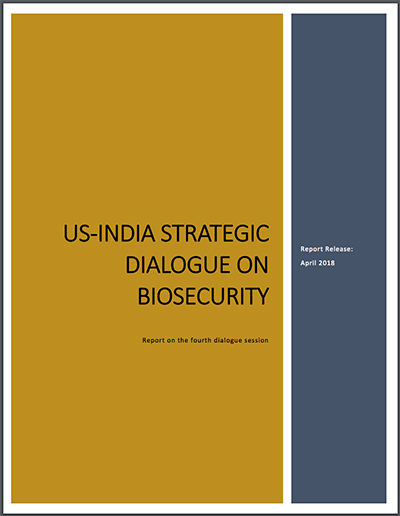Biosecurity dialogue between experts from US, India continues focus on benefits and threats of scientific innovation
Center News

April 10, 2018 - India and the United States would benefit from a shared approach to encourage scientific innovation while preventing the misuse of cutting-edge research, say biosecurity experts from those 2 countries who met in early February in New Delhi, India, as part of an ongoing bilateral dialogue convened by the Johns Hopkins Center for Health Security.
The dialogue, now in its third year, brings together US and Indian senior leaders to examine the biosecurity threat landscapes of their respective countries. In this most recent meeting, the delegation continued to examine the United States’ and India’s respective approaches to biosecurity threats, pinpointed priorities of mutual concern, identified issues requiring greater government attention, and considered opportunities for joint research efforts.
Their discussions were linked by a consistent theme from their previous 3 meetings: In what ways can India and the United States collaborate to manage threats and opportunities posed by biotechnology?
“Promoting cultures of responsibility remains important to mitigate biosecurity risks in the life sciences,” the Center wrote in its summary meeting report. “Bottom-up approaches to biosafety and biosecurity, beginning at the institutional level, [are valuable] given the level of technical expertise required to misuse biotechnology.”
Participants discussed how both countries possess tools to identify risks in life sciences research, but national approaches remain asynchronous. In addition, sharing new thinking about research and practice across scientific disciplines could lead to important advances in biological threat preparedness and response capabilities.
The delegation identified several key topics for the next dialogue meeting in September 2018:
- Establishing a formal partnership between the Regional Centre for Biotechnology (India) and the Center for Health Security that facilitates continued bilateral collaboration around studying, preventing, and mitigating biological threats of mutual concern;
- Developing a plan to ensure the sustainability of a formal bilateral partnership on biosecurity issues;
- Identifying priority biosecurity issues to jointly pursue, including One Health, healthcare delivery and hospital preparedness, biotechnology, basic science research, biosecurity policy research and evaluation, biosafety training, and other forms of biosecurity capacity-building;
- Leveraging shared capabilities in simulation, computing, modeling, data, and analytics to stimulate meaningful advances in the life sciences; and
- Examining the feasibility of elevating future biosecurity dialogues to the Track I (ie, government-to-government) level.
Participants in this “Track II” dialogue represent organizations inside and outside of government, with expertise in biosecurity, biosafety, the life sciences and biotechnology, medicine, public health, geopolitics, and regional security. The Center also hosts a separate Track II multilateral biosecurity dialogue among experts from Singapore, Malaysia, Indonesia, and the United States. Track II dialogues are an opportunity for respected, experienced stakeholders inside and outside of government to collectively identify important issues that merit official policy engagement between and among governments. With this foundation, participants are prepared to engage senior leadership in their home countries in an influential way.
This dialogue and the multilateral dialogue are supported by the Project on Advanced Systems and Concepts for Countering WMD (PASCC, which is sponsored by the Defense Threat Reduction Agency) of the US Air Force Institute for National Security Studies. The Department of Biotechnology of the Government of India’s Ministry of Science and Technology is a collaborative partner, having expanded participation in the dialogue and assisted in developing content for meetings.
About the Johns Hopkins Center for Health Security:
The Johns Hopkins Center for Health Security works to protect people from epidemics and disasters and build resilient communities through innovative scholarship, engagement, and research that strengthens the organizations, systems, policies, and programs essential to preventing and responding to public health crises. The Center is part of the Johns Hopkins Bloomberg School of Public Health and is located in Baltimore, MD.
